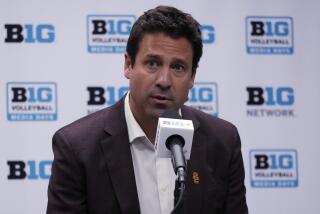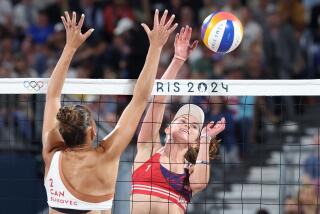AVP Fans Are Seeing Her Take the Beach by Storm
Misty May, one of the top beach volleyball players in the world, was a standout at Newport Harbor High and became national player of the year at Long Beach State in 1997 and 1998. She played briefly for the U.S. indoor national team but left almost immediately for a successful career on the beach. May, however, avoided the Assn. of Volleyball Professionals tour, choosing to play on the rival international tour until signing recently with the AVP.
It didn’t take long for May, 25, to have an impact on the AVP tour with partner Kerri Walsh; they won the first two events.
Question: You and Walsh skipped the AVP the previous two seasons to play solely on the Federation Internationale de Volleyball. It became a sore spot for the AVP, whose officials blanched whenever they were asked about you and Walsh. How does it feel to be on the AVP tour this season?
Answer: We’re happy to be part of the AVP now. Last year wasn’t the right timing. It would have been tough going back and forth. Physically it would have been too demanding on me. That’s why we chose to stay over there in Europe. The FIVB schedule is hard enough and battling the different time zones and playing back and forth. I would have been lucky to survive if we had played both tours. With my knee injury, it was easier to stay on one tour as opposed to going back and forth.
Q: You played almost a year with a partially torn posterior collateral ligament in your knee before undergoing surgery last September. Are you completely healthy?
A: I’m not 100%, but it’s strong. The only thing I can’t do well is bend it. It doesn’t have the flexibility of a normal knee. If I try to get down in a catcher’s position, it won’t bend all the way. It’s better than it was before. I had to be careful stepping off a curb and going up stairs. I didn’t want to spend the rest of my life like that.
Q: Instead of playing for the U.S. indoor team, you chose to forge a pro career on the beach. Do you ever think twice about your decision to play on the beach instead of on the national team?
A: I miss the camaraderie of having a larger team and other teammates. It’s a totally different game and it’s more structured. But I don’t regret coming out to the beach. The environment is great, the people are great, the fan support is awesome. It’s easier on your body, so you can play a lot longer. The season’s shorter and, of course, you can play during the summer.
Q: You began your career with Holly McPeak, choosing to learn under one of the sport’s top veteran players. The two of you qualified for the Sydney Olympics but you left McPeak a few months later in favor of Walsh, a promising young player. How come?
A: Holly taught me so much with her work ethic but it was one of those things when we were going into the Olympics, it was like a tornado. We only had one year to qualify and we had to pass all these good teams to try to get there. The following year, because I had to learn everything so fast, I wanted to have a year where I could take it a little slower. It was nothing against Holly. I respected her as an awesome player and awesome teacher. I just wanted to take it a bit slower. It was so stressful that year and I had to learn the game so fast that I wanted to learn to play the game with someone who had to learn the game as well. I could breathe for a while and have a more kick-back, relaxed tour.
Q: What are your thoughts on the highly criticized Olympic qualifying process? Should U.S. teams be allowed to qualify on their own soil or are you OK with qualifying via the arduous 13-month process currently mandated by the sport’s international governing body?
A: It was tough for Holly and I. I definitely think it would be great if they had a qualifier in our own country. It’s expensive to travel to all the different countries. In other sports like track, they have their trials in the U.S. Why not us?
Q: The international tour and the AVP, longtime adversaries, are actually working together to avoid scheduling conflicts with major tournaments on their respective tours. Did this type of reform need to happen for the sport to survive?
A: It gives our sport more of a chance to grow. Instead of players missing U.S. competitions to play on the FIVB, we can keep our players in the country. It’s great we’re finally able to bring this kind of competition to the U.S. We’re going to be on NBC and Fox Sports Net and the fans are going to be able to see the top teams play without traveling so far.
Q: What must pro beach volleyball do in order to carve its niche among an already overflowing sports scene?
A: How they’re promoting the AVP is making it better already. We have more TV spots and we’re getting the word out there. We’re running little clinics for youths. We’re accessible to the fans. I think everybody’s doing a great job of promoting it and selling it. We have some of the best-looking athletes, and fans can go out there and be loud and rowdy. It’s like, why not be part of this party?
*
T.J. Simers has the day off.


